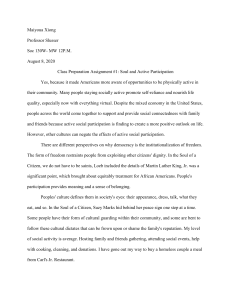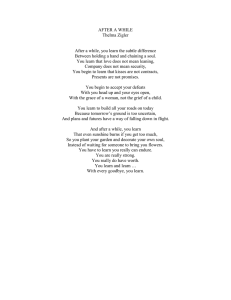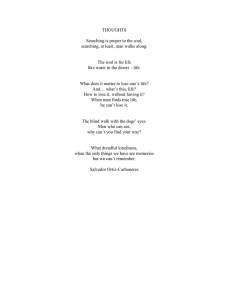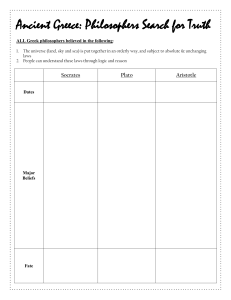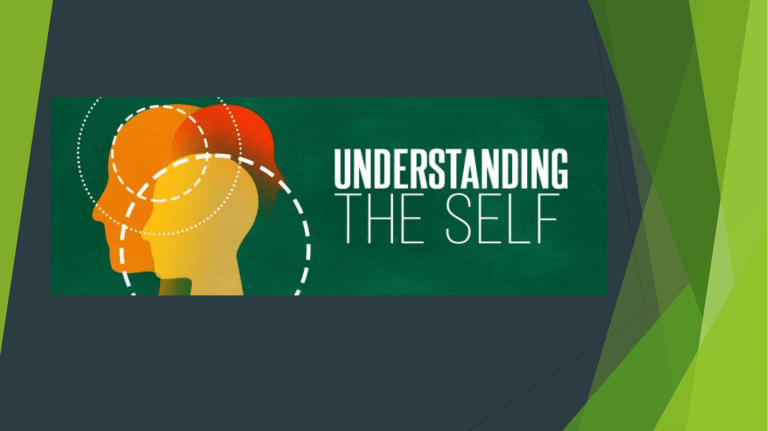
CHAPTER 1: SELF from various Philosophical Perspectives CHAPTER 2: Unmasking the SELF CHAPTER 3: Managing and Caring for the SELF CHAPTER 1: SELF from Various PHILOSOPHICAL Perspectives LEARNING OBJECTIVES: 1. Role of Philosophy in Understanding the Self 2. Different Concepts of the Self from the Philosophical Perspectives 3. Various Concepts of the Self and Identify their similarities 4. Develop your own Philosophy of the Self. What is Philosophy? Finding answers to serious questions about OURSELVES and about the WORLD we live in. What is morally right and wrong? Why? What is a good life? Does God exist? What is the mind? QUESTIONING – exist knowledge and intuitions to get closer to the truth. What will you get out of Philosophy? SKILLS: Critical Thinking (objective analysis & evaluation) Argument skills Communication Skills Reasoning Skills Problem Solving Skills PYTHAGORAS – The first to use the term PHILOSOPHY Philo = greek word for Love Sophia = greek word for Wisdom Philosophy “Love of Wisdom” ORIGIN OF Philosophy & Logic Search for TRUTH ( Search – to look for something ) Search for the MEANING - Importance - Significance - Value - Relevance PHILOSOPHY asks a lot of questions Lesson 1: PHILOSOPHICAL PERSPECTIVE DIFFERENT LINE OF PHILOSOPHERS: GREEK Philosophers MEDIEVAL Philosophers MODERN Philosophers Ancient Greek Philosophers SOCRATES: “ Know thyself ” Philosophers agree that self knowledge is a prerequisite to a happy and meaningful life. Click to add text The unexamined life is not worth living” SOCRATES: “ SOCRATES Every man is dualistic. Composed of Body and Soul Two important aspects of his personhood o BODY – imperfect and impermanent o SOUL – perfect and permanent SOCRATES He was the first thinker to focus on the full power of reason on the human self: who we are, who we should be, and who we will become. The soul strives for WISDOM and PERFECTION. Reason is the soul’s tool to achieve an exalted state of life Our preoccupation with bodily needs such as food, drink, sex, pleasure, material possessions, and wealth keep us from attaining wisdom. - Socrates SOCRATES A person can have a meaningful and happy life only if he becomes virtuous and knows the value of himself that can be achieved through constant SOUL-SEARCHING. For Socrates, this is best achieved when one tries to separate the body from the soul as much as possible. Soul-searching is a long and careful examination of your thoughts and feelings, especially when you are trying to make a difficult moral decision or thinking about something that has gone wrong. PLATO “ The Soul is Immortal” - Student of Socrates - Philosophy of the SELF can be explained as the process of selfknowledge and purification of the soul. - Mind and Soul is given in perfection with God. PLATO : Soul has Three Parts I. RATIONAL SOUL - Reason and Intellect - Divine essence that enables us to think deeply, make wise choices, and achieve a true understanding of eternal truths. - Thinking Soul II. SPIRITED SOUL - Emotion and Passion - Basic emotion such as love, anger, ambition, empathy, and aggressiveness PLATO III. APPETITIVE SOUL - Basic Needs - Includes air, food, shelter These 3 Parts of the Soul are in Dynamic Relationship with one another, but sometimes in CONFLICT. It is the Responsibility of our REASON to sort things out and exert control , restoring a harmonious relationship among the three elements or parts of the SOUL PLATO He believes that GENUINE HAPPINESS can only be achieved by people who consistently make sure that their REASON is in control of their SPIRITS and APPETITES. The Soul is the Essence of the Self “ ARISTOTLE “ - Student of Plato - Body and Soul are not two separate elements but are one thing - The SOUL is simply the form of the body, and is not capable of existing without the body. ARISTOTLE The SOUL is that which makes a person a person. The SOUL is the essence of the SELF. Aristotle suggests that the rational nature of the SELF is to lead a good, flourishing and fulfilling life. Without the BODY the SOUL cannot exist. The Soul dies along with the body. ARISTOTLE to Aristotle, Soul and Body react sympathetically upon each other. A change in the state of the Soul produces a change in the shape of the body and conversely, a change in the shape of the body produces a change in the state of the soul. According ARISTOTLE Aristotle suggested that anything with life has soul. His discussion about the Self centers on the kinds of Soul possessed by a man. He introduced the three kinds of soul ARISTOTLE : Three Kinds of SOUL 1. VEGETATIVE : includes the physical body that can grow.(reproduction & growth) 2. SENTIENT : includes sensual desires, feelings, and emotions (mobility & sensation) 3. RATIONAL : is what makes man Human. It includes the intellect that makes man know and understand things. (thoughts & reflection) Medieval Philosophers St. Augustine of Hippo ST. AUGUSTINE OF HIPPO Integrated the ideas of Plato and Christianity Augustine’s view of the human person reflects the entire spirit of the medieval world. The soul is united with the body so that man may be entire and complete. Believed humankind is created in the image and likeness of God. Therefore, the human person being a creation of God is always geared towards the good. ST. AUGUSTINE OF HIPPO The SELF is known only through knowing God. Self-knowledge is a consequence of knowledge of God. ST. AUGUSTINE OF HIPPO “ Knowledge can only come by seeing the truth that dwells within us “ RENE DESCARTES - “ I am doubting, therefore I am “ - The act of thinking about self – of being self-conscious – is in itself proof that there is self. - Believes in TWO Distinct Entities: 1. COGITO – the thing that thinks;MIND 2. EXTENZA – the extension;BODY RENE DESCARTES Famous in his words Cogito ergo sum which means “ I think therefore, I am “ JOHN LOCKE - “ The Self is Consciousness” - The human mind at birth is tabula rasa or blank slate. - He felt that the SELF is constructed primarily from sense experiences. JOHN LOCKE The SELF is consciousness CONSCIOUSNESS: - necessary to have a coherent personal identity or knowledge of the self as a person. - what makes possible our belief that we are the same identity in different situations. DAVID HUME - “There is no SELF” - SELF is simply a bundle or collection of different perceptions, which succeed each other with an inconceivable rapidly and are in a perpetual flux and movement. - the idea of personal identity is a result of imagination. IMMANUEL KANT - “We Construct the Self” - Self is not just what gives one his personality but also the seat of knowledge acquisition for all human persons. - The Self constructs its own reality creating a world that is familiar and predictable. - Through our rationality, the self transcends sense experience. GILBERT RYLE - “ The SELF is the way people behave “ - Self is not an entity one can locate and analyze but simply the convenient name that people use to refer to all the behaviors that people make. - “ I act therefore, I am”, in short the self is the same as bodily behavior. - The Self is the way people behave. PAUL CHURCHLAND - “ The Self is the Brain” - The SELF is separable from the brain and the physiology of the body. - All we have is the brain, and so, if the brain is gone, there is no self. - The physical brain and not the imaginary mind, gives us our sense of self. - The mind does not really exist MAURICE MERLEAU-PONTY - “The SELF is embodied subjectivity” - The mind-body bifurcation that has been going on for a long time is a futile endeavor and an invalid problem.(no sense/purpose) - All knowledge of our selves and our world is based on subjective experience. - The SELF can never be truly objectified or known in completely objective sort of way. ASYNCHRONOUS ACTIVITY 1. Do you truly know yourself? How would you characterize yourself as a human being? 2. From our discussion today, describe the concept of your SELF. (In 5 to 10 sentences) 3. Choose 5 philosophers among the eleven philosophers discussed and describe each philosopher’s concept of SELF. Deadline of Submission: October 2, 2021 (Saturday) 5:00 PM Next Lesson: October 4, 2021 (Monday) Chapter I: The SELF from various PERSPECTIVES Lesson 1 – Philosophical Perspectives Lesson 2 – SOCIOLOGICAL PERSPECTIVES Lesson 3 – PSYCHOLOGICAL PERSPECTIVES Lesson 4 – Western & Eastern Concepts of the SELF Advance Assignment: For October 9, 2021 (Saturday) 5:00 PM Read on the Western & Eastern Concepts of the Self (Religion) Submit the different concepts of SELF based on RELIGIONS.

